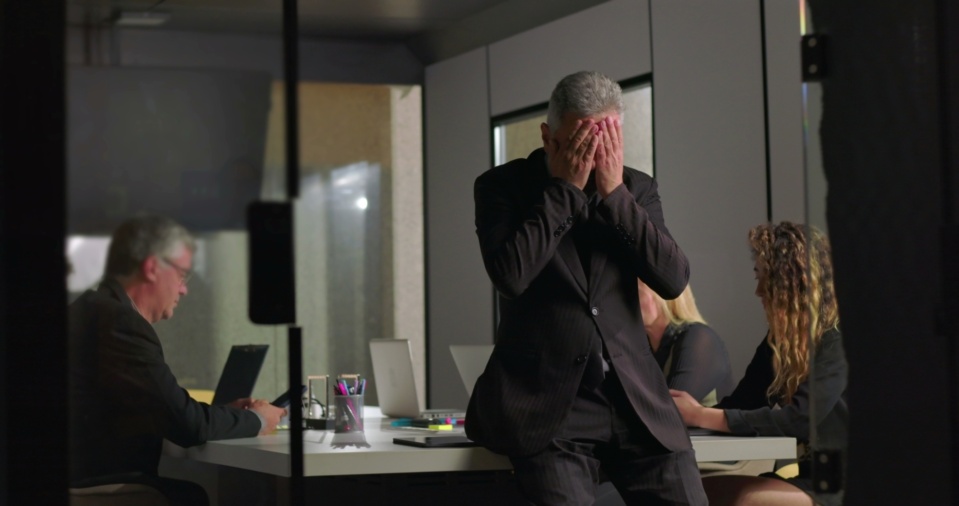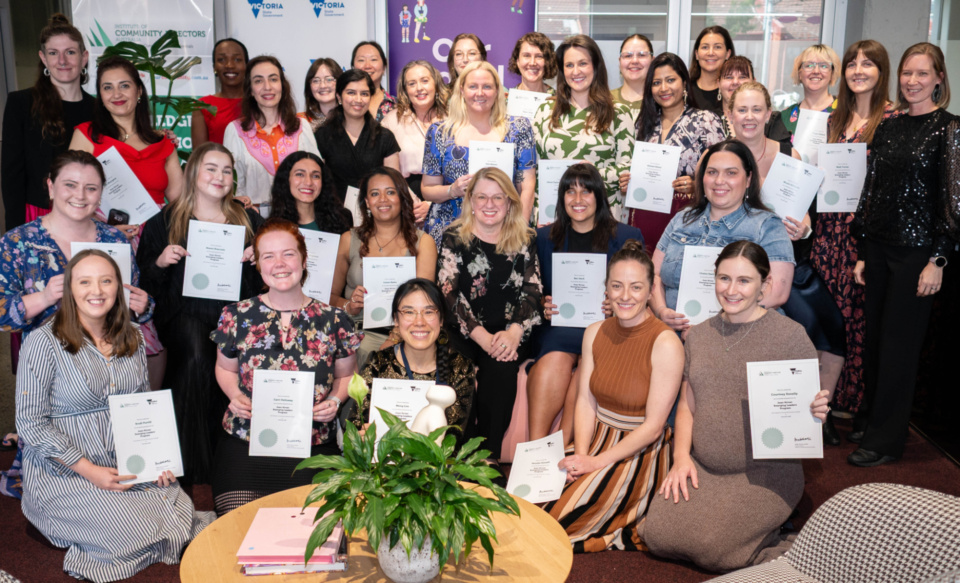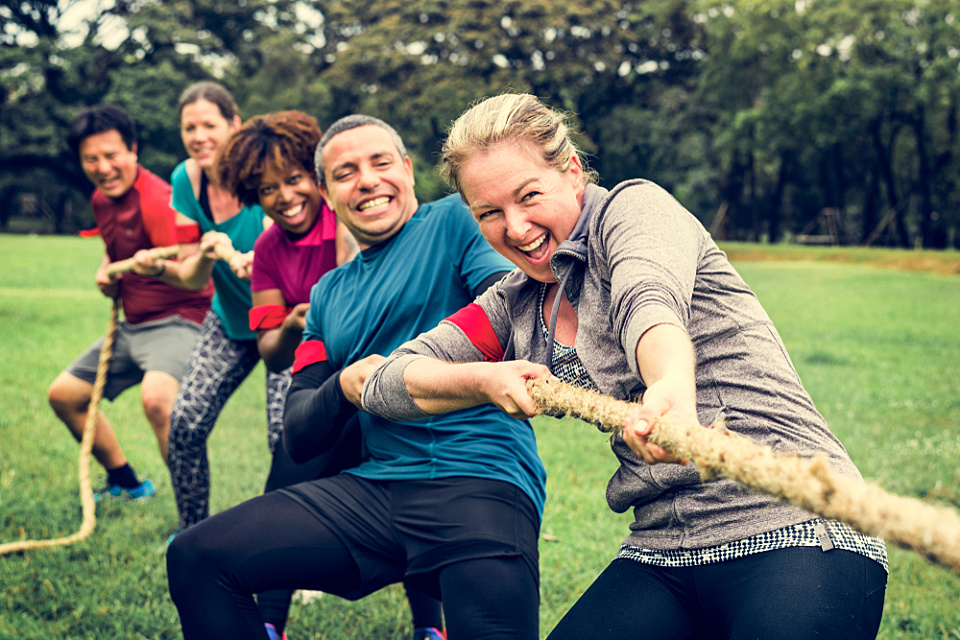
What not-for-profit leaders need to know in 2026
Posted on 12 Feb 2026
Our special NFP trends report distils the views of more than two dozen experts.
Posted on 25 Jun 2025
By Matthew Schulz, journalist, Institute of Community Directors Australia
Vicki Meyer has made promoting volunteering her life’s work. The Institute of Community Directors Australia (ICDA) member and student talks about learning and leading for multiple causes.

3rd Space is a daytime drop-in centre where people experiencing, or at risk of, homelessness find support, friendship and dignity. It helps thousands of people every year by offering hot showers, café-style meals, and access to a range of support services including medical, mental health, legal, tenancy, employment and financial assistance.
Our vision is to break the cycle of homelessness. We couldn’t achieve this without our wonderful team of volunteers, and that’s where I come in.
I joined 3rd Space as volunteer manager towards the end of March. My role is busy and varied, but essentially, if it’s about volunteers, it’s me. I manage recruitment and training, develop strategy and procedures, create new volunteer roles, and support both our corporate volunteer program and student placements. My goal is to create positive volunteer experiences and empower individuals to make a difference in new and meaningful ways. I aim to ensure volunteer voices are embedded in the organisation.

"Throughout my career, I’ve been dedicated to making a difference for causes that matter deeply to me."

Outside of my paid work, I also volunteer in the community. I’ve been fortunate to contribute to several organisations through virtual volunteering, which allows me the flexibility to work full time, manage personal commitments, and still give back.
I’m a board director with Story Dogs and chair of its governance, performance and remuneration committee.
Our amazing volunteers and their furry companions visit schools each week to support children struggling with literacy.
By reading to a dog in a non-judgemental environment, children can build confidence and develop a love of reading. We’ve supported over 2,875 children this year alone.
We currently have 575 volunteer dog teams partnered with 403 schools across Australia, and 80 more teams are ready and waiting for sponsorship.
Our vision is to make reading fun so that every child becomes a confident, lifelong reader.

I’m also a management committee member of Friends of the Koala, where I currently serve as secretary and sit on both the HR and executive committees. I was drawn to their holistic approach to koala protection.
Beyond rescue, rehabilitation and release, the organisation advocates for koala welfare through education, native vegetation protection, tree planting and habitat restoration.
Friends of the Koala operates throughout the Northern Rivers region in NSW.
We also run a native plant nursery and support community-led habitat restoration.
Over our 37-year history, we’ve rehabilitated more than 2,000 koalas, distributed over 800,000 native plants and restored around 59 hectares of koala habitat.
I’m proud to contribute to the organisation’s strategic direction and help ensure strong governance practices as we work to protect koalas for future generations.
Both organisations enable me to volunteer virtually, which is key to balancing work, family and other commitments.

To quote Jane Goodall: “What you do makes a difference, and you have to decide what kind of difference you want to make.”
Throughout my career, I’ve been dedicated to making a difference for causes that matter deeply to me. I’ve led volunteer programs as well as operations and service delivery, and I find it incredibly rewarding. That’s why I continue to work in the not-for-profit sector.
Volunteering allows me to make a difference in another way, and so it complements my paid role. As a volunteer manager, I get to empower and support others, but I also understand the challenges and barriers firsthand. That makes me more empathetic to the volunteering ecosystem.
What our volunteers need – and what I need as a volunteer – has changed over the years. Life is so busy, and we’re so constantly connected that it can be challenging to give back.
The ability to give back in a flexible, virtual way has been crucial for me. It’s allowed me to volunteer, work full time, support my family, and still pursue my interests and learning goals.
Being a board director has greatly complemented my work in the not-for-profit space. I’ve learnt to be more strategic and visionary, and it has strengthened my understanding of the importance of robust governance frameworks. This role has empowered me to think more broadly, fostering a culture of innovation and creativity in the work I do.
It has given me greater context when a CEO or senior leader is implementing changes or new frameworks. I understand this isn’t a “tick and flick” exercise. It’s about the future direction of the organisation and preparing everyone for the journey ahead.
The work I do every day helps shape who I am as a board director. I’ve been able to bring my skills and expertise to the table, contributing recommendations on psychological safety, volunteer strategy and national standards, as well as work health and safety.
Through my board experience, I’ve become more purposeful about strategic direction in my paid role, and more focused on reducing the risk of mission creep. I’ve also strengthened how I communicate vision with my team.
Every role, whether paid or not, has influenced and shaped me for my next role. You never stop learning, and I’ve had the privilege of being mentored by amazing leaders along the way.

Volunteers are incredible! Individually and collectively, volunteers transform lives.
Volunteering strengthens communities and connects people. The collective impact of volunteers makes the world a kinder, more hopeful place.
I have witnessed how volunteering can transform individuals. Research backs up what many of us have known for a long time: volunteering is good for your health. It can be life changing.
There have been so many charities that started due to an individual or group of people identifying a need in our community and stepping in to meet that need.
In Australia, we still have organisations that are entirely volunteer led. Volunteers often underestimate their impact on an organisation, its mission and the clients and cause, but we would be lost without them. I hate to envision a world where volunteers don’t exist. What a sad world that would be.
On a personal level, I started my volunteer journey as a child. Informal volunteering was part of who we were. That and my faith have shaped my passion to make a difference. I love volunteering.
Last year, I spoke at the Story Dogs conference, Volunteering Queensland’s International Volunteer Day event, and Volunteering Queensland’s conference.
At Volunteering Queensland’s conference, I spoke about the national standards for volunteer-involving organisations – something I’m passionate about.
Many boards aren’t aware of the standards, and I believe it’s vital they are informed and understand how this aligns with strategic objectives.
I was leading a project of change in my department and encountered unanticipated challenges. I thrive on change but felt that with this challenge, I needed to explore what I could do to improve and support my team in a way that was meaningful to them.

I was drawn to the Leading for Transformation course because it covered how to navigate unique experiences of staff when planning and implementing change – the timing was perfect!
Overall, I loved the course. It was a great reminder that your leadership style changes, and like personality profiles, you aren’t just one style. For a long time, I thought I had one leadership style. This course was a great reminder that I draw on several styles.
The course also covered the signs of burn-out. It was a great reminder to practise self-care but also how to identify and support others who may be at risk.
I came away from the course so inspired that I met with my CEO to ask for feedback on my leadership style, communication, gaps and strengths. We discussed emerging leadership styles and what the leaders of tomorrow will need to support their team. It is a process that I will continue to do for the rest of my career.
ICDA is an amazing resource for not-for-profit organisations as well as leaders and board directors and a leading voice in the sector. I absolutely love ICDA.
I was looking at becoming a member of other [governance] organisations, but I couldn’t personally justify the expense, and it wasn’t feasible for the charity I was working for.
One night, I received a notification that ICDA was offering free membership, and I signed up straight away. Being a member helps demonstrate my commitment to the sector and good governance frameworks. It is an invaluable endorsement for all NFP leaders.
In addition to becoming a member, I have attended ICDA’s training and webinars and regularly access the policy bank. I am also interested in doing the Diploma of Governance.

Posted on 12 Feb 2026
Our special NFP trends report distils the views of more than two dozen experts.

Posted on 10 Feb 2026
As my family dropped our teenage son off at the airport in the first week of January to embark on a…

Posted on 11 Dec 2025
Community Directors trainer Jon Staley knows from first-hand experience the cost of ignoring…

Posted on 10 Dec 2025
As a qualified yoga instructor who learned the practice in her hometown of Mumbai, Ruhee Meghani…

Posted on 10 Dec 2025
Anyone working in an organisation knows it: meetings follow one after another at a frantic pace. On…

Posted on 10 Dec 2025
Stressed, overwhelmed, exhausted… if you’re on a not-for-profit board and these words sound…

Posted on 10 Dec 2025
The Institute of Community Directors Australia trains over 22,000 people each year, which gives us…

Posted on 03 Dec 2025
Many not-for-profit (NFP) board members in Australia are burnt out, overwhelmed and considering…

Posted on 26 Nov 2025
A roll call of Victoria’s brightest future leaders has graduated from a testing and inspiring…

Posted on 12 Nov 2025
At the Institute of Community Directors Australia, we believe that stronger communities make a…

Posted on 12 Nov 2025
Like many Community Directors members, Hazel Westbury is a community leader who isn’t easily…

Posted on 11 Nov 2025
I’ve seen what happens when fear of conflict wins out over taking a principled stand.